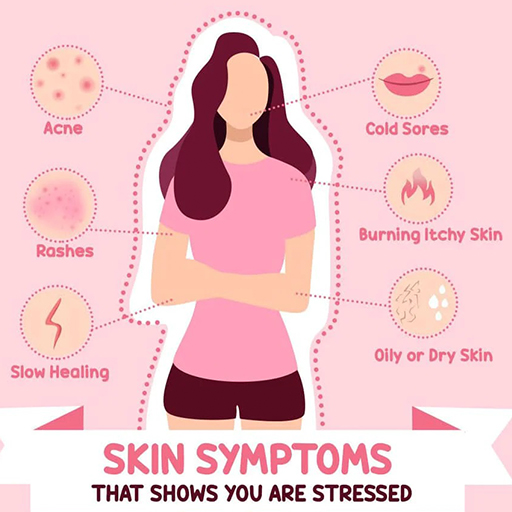How to Deal with Stressed Skin

Let’s be real. We all experience stress in our lives. Sometime, because of the breakup, the loss of something, or due to the busy, hectic routine. If you’re suffering from such a problem, it becomes really difficult for you to pay attention to your skincare routine. However, as a result, stressed skin affects the look and feel of your skin, making it look dull and lifeless.
The levels of the stress hormone cortisol can rise, which can then lead to an increase in inflammation. In consequence, inflammation can make your preexisting skin disorders worse, regardless of what those conditions may be.
However, in this article we discussed, some major causes, sign and prevention of stressed skin. So let’s have a look:
What is Stressed Skin?
Stressed skin is a type of skin condition that is caused by excessive stress. It is characterised by dryness, redness, itching, and flaking of the skin. Moreover, it can also cause breakouts, wrinkles, and other signs of aging. There are variety of causes of Stressed skin, including environmental stressors, lifestyle choices, and medical conditions.
When you are under pressure, your brain causes the production of hormones such as cortisol, adrenaline, and norepinephrine, which are known as the “stress response.” You’ve probably heard of the “fight or flight” reflex before. This is exactly what it is. These hormones, in turn, can have a detrimental effect on the skin, leading to increased sweating, changes in the immune system that can lead to inflammation, and restricted blood flow, each of which can cause the stressed skin to react with blemishes and rashes.
Symptoms of Stressed Skin:
If you find any of the following symptoms in your skin, you’re suffering from stressed skin.
⦁ Rashes and hives
⦁ Irritation
⦁ Rosacea and redness
⦁ Dry and dull skin
⦁ Saggy skin
⦁ Flare-ups of eczema and psoriasis
⦁ Flare-ups of acne, and breakouts
⦁ Chapped and de-hydrated lips.
Just like your heart and lungs, your skin is an organ. Therefore, it is impacted by internal bodily processes, including those brought on by stress.

Factors that can Stress your skin:
Environmental Stressors:
Enviromental factors can cause skin to become dry, irritated, and inflamed. Such as:
⦁ Exposure to extreme temperatures can cause the skin to become dry and cracked.
⦁ Sun damage can lead to premature aging and wrinkles.
⦁ Whereas, air pollution can clog pores and cause breakouts.
Lifestyle Factors:
⦁ Poor diet can lead to nutritional deficiencies that can affect the skin’s health.
⦁ Lack of sleep can cause the skin to become dull and dehydrated.
⦁ Additionally, smoking can damage the skin’s collagen and elastin, leading to premature aging.
Medical Conditions:
⦁ Eczema is a chronic condition that causes red, itchy patches on the skin.
⦁ Psoriasis is an autoimmune disorder that causes red, scaly patches on the skin.
⦁ Rosacea is a chronic condition that causes redness and bumps on the face.
Cosmetics:
The use of non-comedogenic cosmetic makeup products can also lead to stressed skin. However, the major causes of stressed skin are discussed below:
⦁ Chemical peels
⦁ Microdermabrasion
⦁ Laser treatment
Other Factors:
⦁ Over exfoliation
⦁ Shaving
⦁ Treatment of retinol
You can avoid stressed skin by avoiding environmental stressors, maintaining a healthy lifestyle, and treating any underlying medical conditions. Moreover, it is also important to use gentle skincare products that are free from harsh.
Best Ingredients for Stressed Skin:
Home Remedies:
You can use the following home remedies on your skin, to reduce the inflammation:
⦁ Tumeric
⦁ Ice
⦁ Drink more water
⦁ Natural rose water without essential oils
⦁ Aloe vera
⦁ Chilled milk
Skincare Products:
Moreover, if you want to purchase the product to treat stressed skin instead of using home remedies, then you must keep the following ingredients in mind before purchasing it:
⦁ Green tea extract and chamomile: It has an anti-inflammatory property that soothes the skin.
⦁ No-Alcohal: Avoid skincare products that contain alcohal as alcohol degrades the skin’s natural protective layer and the protective surface of the skin.
⦁ Hyaluronic acid and glycerin: Humectants acid and glycerin, assist your skin in holding onto moisture, which ultimately results in a decrease in irritation.
5 Tips to Treat your Stressed Skin:
1. Intake Healthy Foods:
We usually crave for donuts, chocolate, loaf cakes, and so on, when we are feeling stress. However, the fact is that excess sugar can actually make your skin condition worse. It promotes inflammation, which can lead to redness, itching, and irritation. However, you can satisfy your sugar cravings by the following food items:
⦁ Fruit
⦁ Some nuts or seeds
⦁ chew a gum
⦁ eat toffee
⦁ few dates.
2. Follow Healthy Lifestyle:
Free up your energy to alleviate some of that stress and tension. Exercise or workout on a regular and consistent basis will help you get your heart rate up. This will result in fewer breakouts, a stronger skin barrier, and healthier skin as your cholistrol levels will be lower, your blood circulation will be increased, and your endorphins will be stimulated.
However, along with the daily exercise, you can also do face yoga or facials. As facial massage can soften and relax your face muscles.
3. Skip Tea:
Although tea is one of our favourite drinks and is accepted worldwide. It is packed with healthy nutrients and antioxidants. However, consuming it during times of stress will deplete your hormones and damage your skin. Therefore, instead of drinking tea, consume more antioxidant-rich foods such as potatoes, fish, tomatoes, green vegetables, and vitamins.
4. Drink More Water:
When you are facing stress, you probably forget to drink water. As your mind experiences too much load. The fact is that your skin produces less oil during stress, which can lead to rough, dry, and irritated skin. Therefore, it’s really important to keep your skin hydrated and drink at least 8–10 glasses of water per day.
4. Don’t Neglect your Daily Skincare Routine:
Just because of there is so much going on, you might be you might be tempted to skip your regular skincare routine. Try to resist the urge. This is a terrible idea because it will cause you to have even more skin issues in the future. Instead, think of the time you spend on your skincare routine as “me time.”. Moreover, use your regular skincare products like moisturiser, serum, and cleanser etc to relax and take care of yourself.


